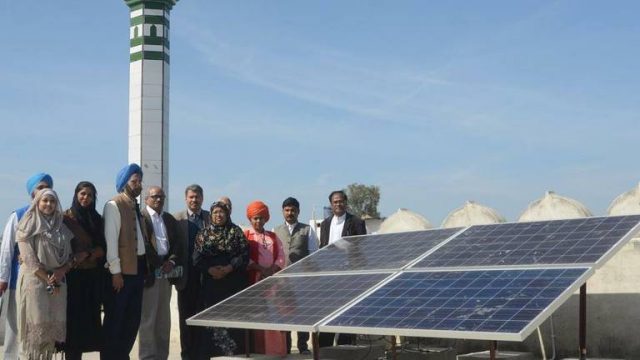Recently Lucknow’s first all women mosque, Ambar Masjid on PGI road, has contributed its bit to the environment by switching to clean solar energy, and saving on some hefty electricity bills in the process. It was an initiative taken to improve Lucknow’s degrading air quality. The Mosque will operate on 100% clean and renewable energy. Various religious leaders were invited to inaugurate the solar panel on February 7 to send out the message of universal brotherhood.
This act of contributing towards giving back to the nature, was something that really made me as a Muslim, ponder over the verses of Quran which always teaches about giving back to our mother nature. And, my conscience has decided to explore the mosque of 21st century, which in name of Allah is helping many by doing their little. But then the question rises: Are we doing what is needed.
“The decision for installation of solar panels was taken considering the harmful effect of coal on the environment and also to become self-independent and what could have been better than solar energy which is available in abundance” said Shaista Ambar, founder president of All-India Muslim Women Personal Law Board.(Trustee Ambar Masjid)
According to Ms. Ambar, Lucknow is a fast growing city with degrading quality of air and pacing development but in due course the nature is being effected. While issues such as vehicular emission and industrial waste-discharges need government interference, reducing dependence on electricity is something that all of us should think about.
“The purpose to construct women inclusive mosque was to put an end to the patriarchy against women existing within the community and since its establishment in 1997, we have been involved in helping women with issues such as, education of girl child, Talaq and counselling of married couples.The premises is also used as Dharmshala for the needy”, she added. Famous Islamic scholar late Hazrat Ali Miyan Nadvi had laid the foundation stone of Amber mosque and though it started as a women’s mosque, men are also allowed to offer prayers.
But as my mapping went further, Ambar masjid was not alone which is dedicated to shift from nonrenewable source of energy to renewable one. In fact, Minara Mosque in the Bhendi Bazaar region of Mumbai went for an eco – friendly set up in January this year and opted to install solar panel worth 15 lakhs which the trustees feel will be recovered in 4 years. Not, only this the electricity which was consumed in the mosque can now be supplied to the nearby area who face power cut very often.
Taking a dipper dig, there are several areas down south where the villages witness a power cut but the mosques around the areas are powered with Solar panels. After prayers, this is very often used as study centre by the children of local community.
The green and cleaner India begins with us, and many Indians are unaware of the fact that the of source of electricity is limited and is to be used keeping its ills into account. Very often at work places people waste energy which results into heavy load on life of those who are in real need. For Ajay, in literate sense “Light is a ray of hope” every night after helping his father with his groceries business. Ajay sits under the only street lamp of his area to prepare for civil services. ‘My house has no power supply, and sitting under the lamp is the only possible way to receive education’, added Ajay.
Many fail to understand that India imports a lot of coal, and energy security is a big issue. Everybody was cognizant of climate change and environmental impacts and the government was beginning to understand – after the U.S. and Europe got into renewables – that it was going to be a significant sector.
Given the huge social cost of burning coal – severe air pollution, increased mortality, destruction of the environment and expropriation of the poor from coal-bearing lands — should the government go down this road? Given the threat from global warming, will the international community even allow it to do so without imposing severe penalties upon it? Let’s consider an India which is part of first world countries in future.






